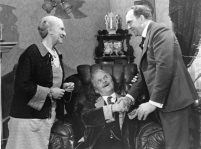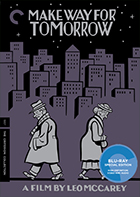Make Way for Tomorrow [Blu-Ray]
|
 In the video interview he recorded for the 2010 DVD release of Leo McCarey's criminally neglected Make Way for Tomorrow, filmmaker and critic Peter Bogdanovich shares (as he is wont to do) a story about a conversation he had with Orson Welles. Bogdanovich was having dinner with Welles in the mid-1960s and asked him if he had ever seen the film, to which Welles roared, "Oh my God! That is the saddest movie ever! It could make a stone cry." (pause) "And no one saw it."
In the video interview he recorded for the 2010 DVD release of Leo McCarey's criminally neglected Make Way for Tomorrow, filmmaker and critic Peter Bogdanovich shares (as he is wont to do) a story about a conversation he had with Orson Welles. Bogdanovich was having dinner with Welles in the mid-1960s and asked him if he had ever seen the film, to which Welles roared, "Oh my God! That is the saddest movie ever! It could make a stone cry." (pause) "And no one saw it."
Welles is right on all counts, as Make Way for Tomorrow is one of the saddest, much touching, and most powerfully introspective films produced during the classical era of Hollywood cinema, and it was virtually unseen when it was first released and, as a result, suffered historical neglect in favor of McCarey's more popular films such as Duck Soup (1933), The Awful Truth (1937), and The Bells of St. Mary's (1945). When he directed Make Way for Tomorrow, McCarey was at the top of his professional game (he was awarded a Best Director Oscar the following year for The Awful Truth and then again in 1945 for Going My Way). After having made a name for himself during the silent era directing dozens of comedy shorts, including many starring Laurel and Hardy (it was his idea to pair them), McCarey hit his stride in the 1930s with a series of memorable features that demonstrated his range and rare ability to mix humor and pathos, as well as his ability to work with actors of all kinds (he directed the Marx Brothers, Mae West, and Harold Lloyd and was also responsible for helping to shape Cary Grant into a movie star in four films). Nevertheless, Make Way for Tomorrow was largely ignored at the time despite rave reviews from critics, perhaps because it hit a little too close to home. American audiences tend to seek out entertainment that is rewarding and uplifting and, more often than not, simplified and watered down, which is why Bogdanovich notes that Make Way for Tomorrow feels like something out of Europe rather than Hollywood. With a complete lack of both sentimentality and judgment (save one clumsy line of dialogue near the very end), McCarey's film pursues the hard-edged truths about the physical and emotional dispersion of the modern American family and the way in which different generations are all but incapable of sharing the same space. The film opens in the home of an elderly couple, Barkley and Lucy Cooper (Victor Moore and Beulah Bondi), who have invited their grown children for a reunion to inform them that they have run out of money and the bank is repossessing their house. As this is pre-Social Security, they literally have nowhere to go and no income to support themselves. Their children are understandably caught off-guard and try to deal with the situation as best then can, which means inviting their aged parents to live with them. As this is taking place during the Depression and the children are struggling to make ends meet themselves, there is no way that any one of them can take both parents, so they must be split up. Thus, Lucy goes to live in Chicago with their oldest son George (Thomas Mitchell), his wife Anita (Fay Bainter), and their college-age daughter Rhoda (Barbara Read), while Bark goes off to live in New York with their oldest daughter Cora (Elisabeth Risdon) and her husband. Best intentions aside, the situation is anything but smooth, as the presence of the parents disrupts the rhythm and flow of their children's lives, which starts a slow boil of frustration and then resentment. Rhoda resents having to share her room with her grandmother and how her friends stop coming by because the old lady talks their ear off, while Anita is frustrated to no end with Lucy's well-meaning, but ultimately intrusive attempts to "help" around the house and the way in which she inserts herself into every situation, especially her evening bridge class. Meanwhile, Bark finds his only solace by spending time at a neighborhood paper store with the elderly Jewish owner (Maurice Moscovitch) because at Cora's house he is stuck on the sofa and treated like a child when he gets sick. In a lesser film, McCarey would have sided with one generation over the other, either by depicting the elderly parents as stubborn relics from a previous era or the grown children as selfish, ungrateful wretches. Instead, he shows us deeply flawed, but also deeply caring characters on both sides of the generational divide who want to do the right thing, but find that life is complicated and relationships are oftentimes fraught with assumptions and misunderstandings (he is also aided by outstanding performances by his cast of notable character actors, particularly Moore and Bondi, who successfully play characters in their seventies without ever betraying the fact that they were both about two decades younger than that). At times the parents are unnecessarily stubborn: Lucy has a way of saying "Don't worry about me" that screams "guilt trip" while Bark unapologetically insults a young doctor who is called in to give him a check-up when he's sick, thereby displaying his own internalized ageism. At the same time, though, the children and their spouses are frequently too caught up in their own desires to recognize what they could and should be doing, and as a result they neglect the needs of the people who raised them into the world. After watching Make Way for Tomorrow, I was reminded of Roger Ebert's perceptive analysis of Spike Lee's Do the Right Thing (1989), a very different kind of film that nonetheless treads the same ground of showing different groups of people hopelessly locked in misunderstanding and prejudice. Noting how many of the initial viewers at the Cannes Film Festival were determined to lay blame on someone in the film, Ebert wrote, "Perhaps I was too idealistic, but it seemed to me that any open-minded member of the audience would walk out of the movie able to understand the motivations of every character in the film—not forgive them, perhaps, but to understand them." Make Way for Tomorrow offers us a similarly powerful challenge in asking us to see past the surface of its characters and into the complex inner workings of their hearts and their minds, which are fraught with both good intentions and personal, self-serving desires. Are the parents right at the end of the film when they refuse to show up for dinner with their children because they are too busy enjoying each other and reliving their honeymoon experience at the Vogart Hotel in New York City? Not any more right than Anita is to be infuriated at Lucy for withholding information from her about Rhoda's dating an older man. The point is that McCarey shows us these characters for what they are—deeply human—and asks us to see them as such, rather than as right or wrong, good or bad. Thus, when it comes to the uncompromised ending, which flies in the face of typical Hollywood uplift, the film has earned its tears and hopefully made us think a little bit more about the people around us and how we treat them.
Copyright ©2010 James Kendrick Thoughts? E-mail James Kendrick All images copyright © The Criterion Collection | |||||||||||||||||||||||||||||||||||
Overall Rating:



 (3.5)
(3.5)
Subscribe and Follow
Get a daily dose of Africa Leader news through our daily email, its complimentary and keeps you fully up to date with world and business news as well.
News RELEASES
Publish news of your business, community or sports group, personnel appointments, major event and more by submitting a news release to Africa Leader.
More Information
